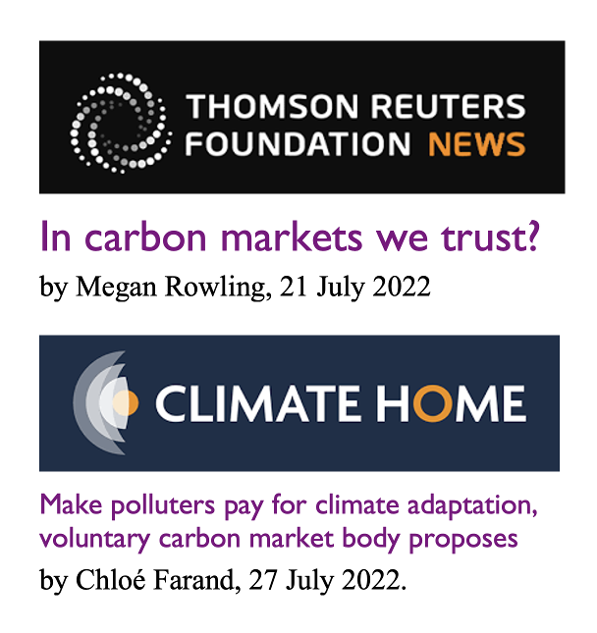
Several recent news articles have highlighted the proposal for a Share of Proceeds for Adaptation (or SOPA) as a Core Carbon Principle of the Voluntary Carbon Market (VCM). Reuters, for example, published an article, In carbon markets we trust? New global guidance aims to stop greenwashing, which includes the excerpt below on SOPA in the VCM. The article was written by Megan Rowling, Thomson Reuters Foundation, and published on 21 July 2022. Another article, Make polluters for climate adaptation, voluntary carbon market body proposes, was written by Chloé Farand for Climate Home News and published on 27 July.
Excerpt from the Reuters article:
“There are growing calls for projects that generate offsets for the voluntary carbon market to consider their social impacts, too. That could range from ensuring they do not prevent local communities from accessing forest land to boosting basic services and incomes.
Benito Müller, professor at Oxford University's Environmental Change Institute, described social integrity as ‘the forgotten twin’ of environmental honesty. Socially beneficial credits should not be available only as a sub-category in the market, he noted. ‘That's not enough to safeguard the market overall from the serious reputational risk of being accused of lacking social integrity by leaving the poorest and most vulnerable people behind,’ he added.
A coalition convened by Müller is advocating for a 5% charge on all credits in the voluntary market - in line with Paris Agreement rules for government offsets - to help at-risk nations adapt to climate-linked extreme weather and rising sea levels, regardless of whether they attract carbon credit projects. This ‘share of proceeds for adaptation’, distributed through an existing U.N. fund, could generate as much as $2.5 billion annually, based on independent estimates that the voluntary carbon market could be worth $30 billion to $50 billion by 2030, he noted.
The idea - backed by many of the poorest countries and small island developing states - has been submitted for potential inclusion in the forthcoming Core Carbon Principles.
Charles Hamilton, climate change advisor to the Bahamas government, pointed out that it was in companies’ self-interest to play their part alongside governments in cutting emissions, while helping those on the frontlines of a warming world. ‘These goals and these principles at the end of the day are about protecting people... If our islands no longer exist, you are losing your own customer base,’ he added. ‘We all have to put skin into the game, both from the public and the private sector.’”
